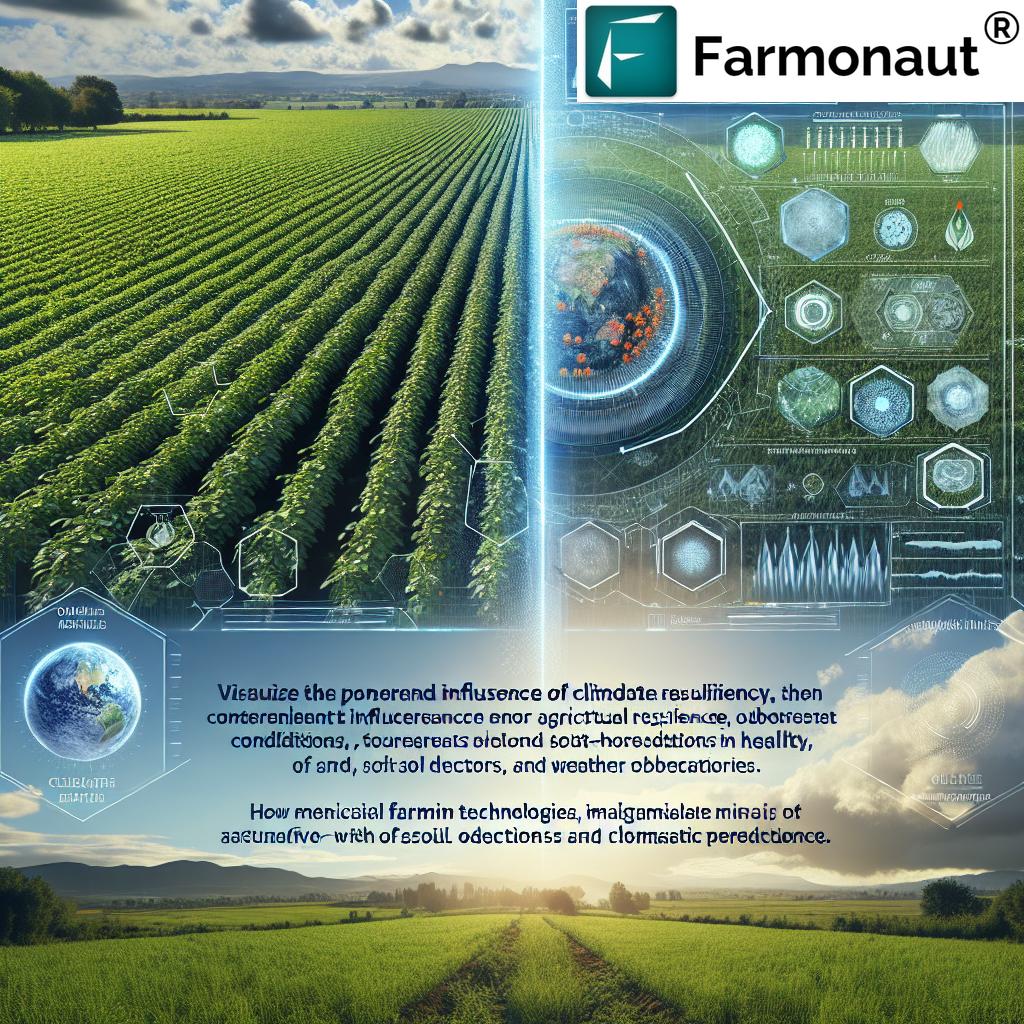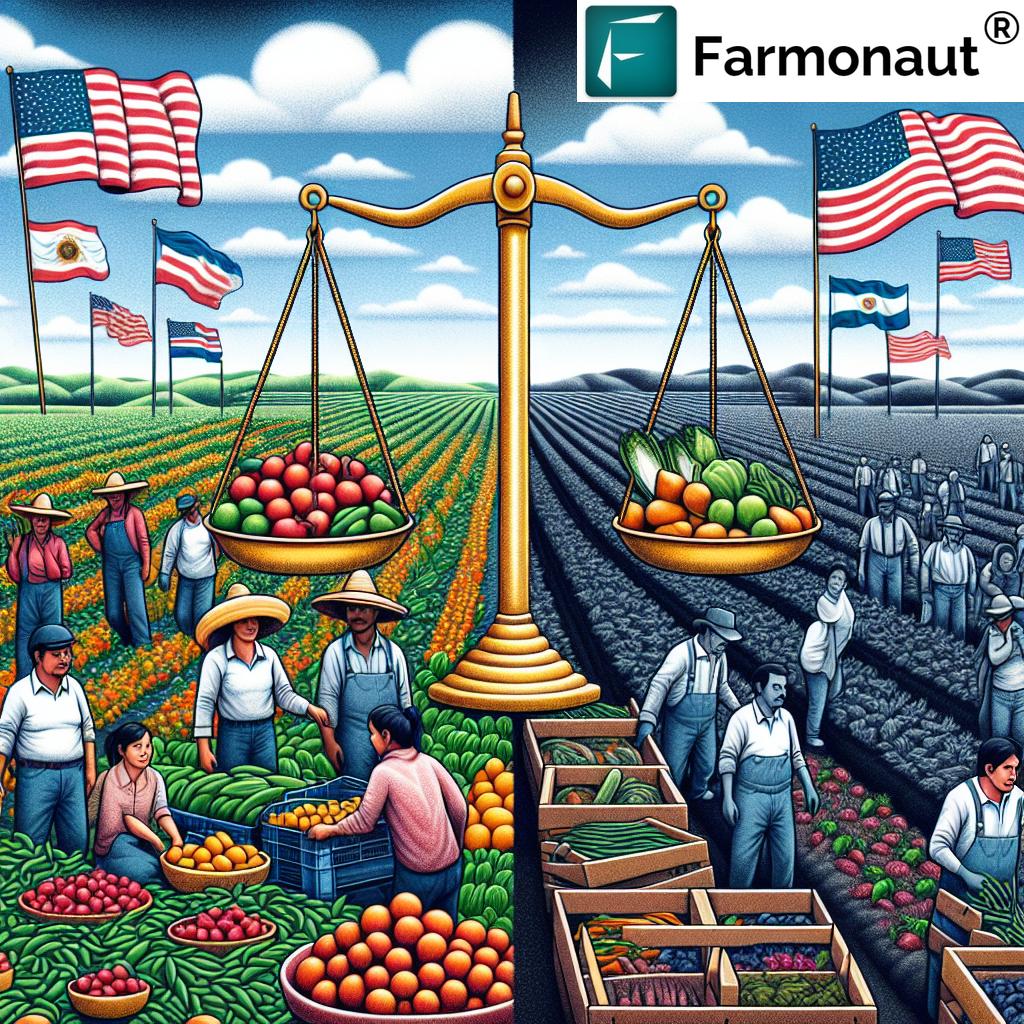Enhancing Agricultural Resilience: How Farmonaut’s Precision Technology Aligns with USDA Climate Hubs Initiative

“USDA Climate Hubs initiative collaborates with precision agriculture technologies to enhance farm resilience across 10 regional centers.”
In an era of climate change and increasing agricultural challenges, the United States Department of Agriculture (USDA) and innovative agritech companies like Farmonaut are at the forefront of revolutionizing farming practices. This blog post explores how Farmonaut’s cutting-edge precision technology aligns with the USDA Climate Hubs initiative to enhance agricultural resilience and productivity. We’ll delve into the latest trends in precision agriculture, geospatial data utilization, and sustainable farming practices that are transforming the industry.
The USDA Climate Hubs Initiative: A Foundation for Resilient Agriculture
The USDA Climate Hubs initiative is a groundbreaking program designed to address the growing challenges faced by farmers and ranchers in the United States. Established to provide science-based information and tools, these hubs aim to help agricultural producers adapt to climate change and enhance the resilience of working lands.
- Regional Focus: With 10 regional centers across the country, the USDA Climate Hubs tailor their approach to local climate-related risks and challenges.
- Collaborative Approach: The hubs bring together various USDA agencies, universities, and state and local governments to provide comprehensive support.
- Research and Implementation: They conduct region-specific research and develop practical strategies for climate adaptation and mitigation in agriculture.
The USDA Climate Hubs serve as a crucial link between scientific research and on-the-ground implementation, ensuring that farmers have access to the latest knowledge and tools to build resilience in their operations.
Farmonaut: Pioneering Precision Agriculture Technology
Farmonaut stands at the intersection of agriculture and technology, offering innovative solutions that align seamlessly with the goals of the USDA Climate Hubs. As a leading provider of satellite-based farm management solutions, Farmonaut is revolutionizing the way farmers approach agricultural challenges.
Key Technologies offered by Farmonaut:
- Satellite-Based Crop Health Monitoring
- AI-Driven Advisory Systems
- Blockchain-Based Traceability
- Resource Management Tools
These technologies not only enhance productivity but also promote sustainable farming practices, aligning perfectly with the USDA’s mission to build resilient agricultural systems.
Leveraging Geospatial Data in Agriculture
One of the most significant advancements in modern agriculture is the utilization of geospatial data. Both the USDA Climate Hubs and Farmonaut heavily rely on this technology to drive informed decision-making and enhance agricultural productivity.
How Geospatial Data Transforms Agriculture:
- Precise Crop Monitoring: Satellite imagery provides real-time insights into crop health and growth patterns.
- Resource Optimization: Geospatial data helps in efficient allocation of water, fertilizers, and pesticides.
- Risk Assessment: Climate-related risks can be better predicted and managed using geospatial analysis.
- Yield Forecasting: Accurate predictions of crop yields help in better market planning and food security measures.
Farmonaut’s advanced geospatial data analysis capabilities complement the USDA’s efforts in providing farmers with actionable insights. By integrating satellite imagery with AI and machine learning algorithms, Farmonaut offers a comprehensive view of agricultural landscapes, enabling precise and timely interventions.
Explore Farmonaut’s Geospatial Solutions:
Enhancing Agricultural Land Resilience
Building resilience in agricultural lands is a key focus area for both the USDA Climate Hubs and Farmonaut. This involves developing strategies to withstand and recover from climate-related stresses while maintaining productivity.
Strategies for Enhancing Land Resilience:
- Soil Health Management: Implementing practices that improve soil structure and organic matter content.
- Water Conservation: Adopting efficient irrigation techniques and water-saving technologies.
- Crop Diversification: Planting a variety of crops to reduce vulnerability to pests and diseases.
- Climate-Smart Agriculture: Implementing practices that reduce greenhouse gas emissions and adapt to changing climate conditions.
Farmonaut’s technology plays a crucial role in implementing these strategies. By providing real-time data on soil moisture, crop health, and weather patterns, Farmonaut enables farmers to make informed decisions that enhance the resilience of their lands.
Sustainable Farming Practices: A Shared Vision
Both the USDA Climate Hubs and Farmonaut are committed to promoting sustainable farming practices. These practices not only help in mitigating climate change but also ensure long-term agricultural productivity.
Key Sustainable Farming Practices:
- Conservation Tillage: Reducing soil disturbance to improve soil health and reduce erosion.
- Precision Nutrient Management: Using data-driven approaches to optimize fertilizer application.
- Integrated Pest Management: Employing holistic strategies to manage pests while minimizing environmental impact.
- Agroforestry: Integrating trees and shrubs into agricultural landscapes for environmental and economic benefits.
Farmonaut’s precision agriculture technologies support these sustainable practices by providing farmers with the data and insights needed to implement them effectively. For instance, the company’s satellite-based crop monitoring can help in precise nutrient management, reducing over-application of fertilizers and minimizing environmental impact.
“Farmonaut’s geospatial data analysis improves agricultural productivity by up to 25% while promoting sustainable farming practices.”
Agricultural Fraud Prevention and Program Integrity
Ensuring the integrity of agricultural programs is crucial for the effective implementation of sustainability and resilience initiatives. Both the USDA and Farmonaut place a strong emphasis on fraud prevention and maintaining program integrity.
USDA’s Approach to Program Integrity:
- Rigorous Oversight: Implementing strict monitoring and evaluation processes for agricultural programs.
- Data-Driven Verification: Utilizing advanced data analysis to verify program compliance and detect anomalies.
- Whistleblower Protection: Encouraging reporting of violations while protecting the identities of whistleblowers.
- Transparent Reporting: Regular publication of audit reports and investigations to maintain public trust.
Farmonaut complements these efforts through its blockchain-based traceability solutions and satellite verification capabilities. These technologies provide an additional layer of transparency and verification, helping to prevent fraud in agricultural supply chains and program implementation.
Advanced Soil Health Monitoring Techniques
Soil health is fundamental to agricultural resilience and productivity. The USDA Climate Hubs emphasize the importance of soil health, and Farmonaut provides cutting-edge tools for monitoring and improving soil conditions.
Innovative Soil Health Monitoring Approaches:
- Remote Sensing: Using satellite and drone imagery to assess soil properties and health indicators.
- IoT Sensors: Deploying in-field sensors to collect real-time data on soil moisture, temperature, and nutrient levels.
- Spectral Analysis: Utilizing spectral imaging to detect soil composition and organic matter content.
- AI-Powered Predictive Models: Developing models that forecast soil health trends and recommend management practices.
Farmonaut’s satellite-based monitoring systems contribute significantly to these efforts by providing large-scale, high-frequency data on soil conditions. This information allows farmers to make timely decisions on soil management, aligning with the USDA’s goals of promoting soil health and sustainable land use.
Agricultural Data Management Systems: The Backbone of Precision Farming
Effective agricultural data management is crucial for implementing precision farming techniques and enhancing overall productivity. Both the USDA and Farmonaut recognize the importance of robust data management systems in modern agriculture.
Key Components of Agricultural Data Management:
- Data Collection: Gathering information from various sources including satellites, sensors, and farm equipment.
- Data Integration: Combining multiple data streams to create comprehensive farm insights.
- Data Analysis: Employing advanced analytics and AI to derive actionable insights from raw data.
- Data Visualization: Presenting complex information in easily understandable formats for farmers and stakeholders.
Farmonaut’s platform excels in these areas, offering a user-friendly interface that allows farmers to access and interpret complex agricultural data easily. This aligns with the USDA’s efforts to promote data-driven decision-making in agriculture.
Explore Farmonaut’s Data Management Solutions:
Farmonaut API |
API Developer Docs
Enhancing Agricultural Productivity: A Collaborative Effort
Improving agricultural productivity while maintaining sustainability is a core objective shared by the USDA Climate Hubs and Farmonaut. This collaborative effort involves leveraging technology, research, and on-ground implementation to boost farm yields and efficiency.
Strategies for Enhancing Agricultural Productivity:
- Precision Agriculture: Utilizing data-driven approaches for optimal resource use and crop management.
- Climate-Resilient Crop Varieties: Developing and promoting crops that can withstand changing climate conditions.
- Smart Irrigation Systems: Implementing water-efficient irrigation technologies guided by real-time data.
- Integrated Pest and Disease Management: Using advanced monitoring and targeted interventions to minimize crop losses.
Farmonaut’s technologies play a crucial role in implementing these strategies. For instance, its satellite-based crop monitoring system enables farmers to detect and respond to pest infestations or water stress early, significantly improving crop yields.

The Future of Farming: AI and Machine Learning in Agriculture
As we look to the future, artificial intelligence (AI) and machine learning are set to play an increasingly important role in agriculture. Both the USDA and Farmonaut are at the forefront of integrating these technologies into farming practices.
AI and Machine Learning Applications in Agriculture:
- Predictive Analytics: Forecasting crop yields, pest outbreaks, and market trends.
- Automated Decision Support: Providing AI-driven recommendations for farm management decisions.
- Robotics and Automation: Developing AI-powered machines for planting, harvesting, and crop monitoring.
- Image Recognition: Using AI to analyze satellite and drone imagery for crop health assessment.
Farmonaut’s Jeevn AI Advisory System is a prime example of how AI is being leveraged to revolutionize farming. This system provides personalized, data-driven advice to farmers, helping them make informed decisions about crop management, resource allocation, and risk mitigation.
USDA Climate Hubs and Farmonaut Solutions Comparison
| Agricultural Challenge | USDA Climate Hub Approach | Farmonaut Technology Solution |
|---|---|---|
| Soil Health Monitoring | Regional soil testing programs and education initiatives | Satellite-based soil moisture and health analysis |
| Climate Resilience | Development of climate-adaptive strategies and crop varieties | AI-driven climate risk assessment and adaptation recommendations |
| Water Management | Promotion of water-efficient irrigation techniques | Real-time soil moisture monitoring and smart irrigation advice |
| Crop Productivity | Research on high-yield, climate-resilient crop varieties | Precision agriculture tools for optimized crop management |
| Pest Management | Integrated Pest Management (IPM) strategies | Early pest detection using satellite imagery and AI analysis |
Conclusion: A Synergistic Approach to Agricultural Resilience
As we’ve explored throughout this blog post, the alignment between Farmonaut’s precision technology and the USDA Climate Hubs initiative represents a powerful synergy in addressing the challenges of modern agriculture. By combining the USDA’s extensive research and outreach capabilities with Farmonaut’s cutting-edge technological solutions, we are witnessing a transformative approach to enhancing agricultural resilience and productivity.
The integration of geospatial data, advanced soil health monitoring, AI-driven advisory systems, and sustainable farming practices is paving the way for a more resilient and productive agricultural sector. As climate challenges continue to evolve, this collaborative approach between government initiatives and innovative agritech companies will be crucial in ensuring food security and sustainable agricultural practices for future generations.
We encourage farmers, agronomists, and agricultural stakeholders to explore the resources and technologies available through both the USDA Climate Hubs and Farmonaut. By leveraging these tools and insights, we can work together towards a more resilient, sustainable, and productive agricultural future.
Explore Farmonaut’s Mobile Apps:
FAQ Section
Q1: How does Farmonaut’s technology complement the USDA Climate Hubs initiative?
A1: Farmonaut’s precision agriculture technologies, such as satellite-based crop monitoring and AI-driven advisory systems, provide farmers with detailed, real-time data and insights. This complements the USDA Climate Hubs’ broader research and outreach efforts by offering practical, on-the-ground tools for implementing climate-resilient farming practices.
Q2: What are the main benefits of using Farmonaut’s platform for farmers?
A2: Farmers using Farmonaut’s platform can benefit from real-time crop health monitoring, personalized farm management advice, efficient resource allocation, early pest and disease detection, and improved decision-making based on data-driven insights.
Q3: How does Farmonaut contribute to sustainable farming practices?
A3: Farmonaut promotes sustainable farming by providing tools for precise resource management, reducing over-application of inputs like water and fertilizers, and supporting integrated pest management. This leads to more environmentally friendly farming practices and reduced carbon footprint.
Q4: Can small-scale farmers benefit from Farmonaut’s technology?
A4: Yes, Farmonaut’s solutions are designed to be accessible and beneficial for farmers of all scales. The platform offers affordable options and user-friendly interfaces, making advanced agricultural technology accessible to small-scale farmers.
Q5: How does Farmonaut ensure the security and privacy of farm data?
A5: Farmonaut employs robust data security measures, including encryption and secure data storage protocols. The company adheres to strict privacy policies to ensure that farmers’ data is protected and used only for the intended purposes of improving farm management and productivity.
















